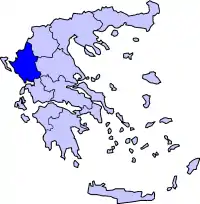Epirus
English

Epirus (periphery of Greece)
Etymology
From Latin Ēpīrus, from Ancient Greek Ἤπειρος (Ḗpeiros, “mainland”).
Pronunciation
- IPA(key): /ɨˈpaɪəɹəs/
Proper noun
Epirus
- A traditional geographic region lying partly in northwestern Greece (where it includes Arta, Ioannina, Preveza and Thesprotia) and partly in southern Albania (an area known as Northern Epirus).
- (historical) A larger historical kingdom in roughly the same region, widely extended by the Greek general and king Pyrrhus during the early Hellenistic period.
- One of the thirteen peripheries (administrative regions) of modern Greece.
Derived terms
- Northern Epirus
Translations
region; historical kingdom
|
one of the 13 peripheries
- The translations below need to be checked and inserted above into the appropriate translation tables, removing any numbers. Numbers do not necessarily match those in definitions. See instructions at Wiktionary:Entry layout#Translations.
Translations to be checked
|
|
See also
Czech
Dutch
Alternative forms
Pronunciation
Audio (file)
Latin
Alternative forms
Etymology
From Ancient Greek Ἤπειρος (Ḗpeiros).
Proper noun
Ēpīrus f (genitive Ēpīrī); second declension
- Epirus (region and historical kingdom in modern Albania and Greece)
Declension
Second declension.
| Case | Singular |
|---|---|
| Nominative | Ēpīrus |
| Genitive | Ēpīrī |
| Dative | Ēpīrō |
| Accusative | Ēpīrum |
| Ablative | Ēpīrō |
| Vocative | Ēpīre |
References
- Epirus in Charlton T. Lewis and Charles Short (1879) A Latin Dictionary, Oxford: Clarendon Press
- Epeirus in William Smith, editor (1854, 1857) A Dictionary of Greek and Roman Geography, volume 1 & 2, London: Walton and Maberly
- Epirus in Gaffiot, Félix (1934) Dictionnaire Illustré Latin-Français, Hachette
This article is issued from Wiktionary. The text is licensed under Creative Commons - Attribution - Sharealike. Additional terms may apply for the media files.